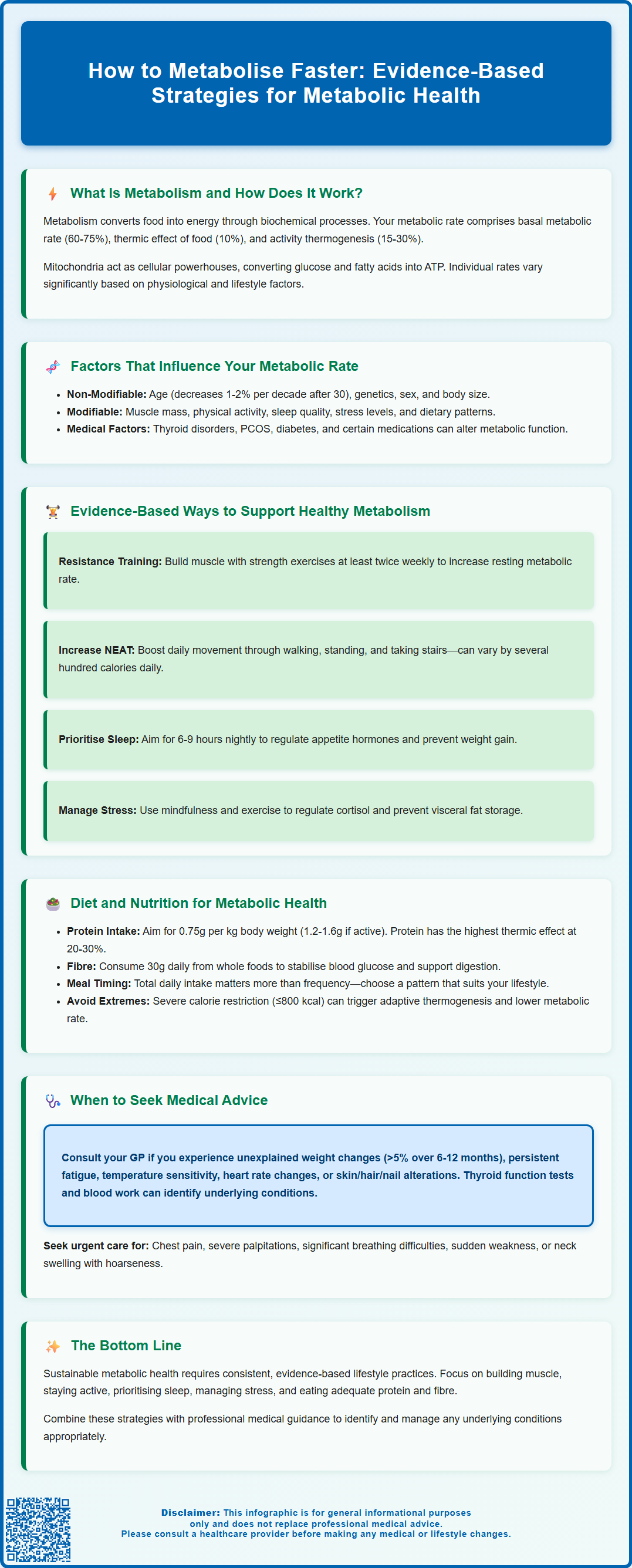Many people wonder how to metabolise faster, hoping to boost energy levels or support weight management. Whilst you cannot dramatically alter your metabolic rate, understanding the factors that influence metabolism empowers you to make evidence-based choices that support optimal metabolic function. Your metabolism encompasses all biochemical processes that convert food into energy for essential bodily functions. This article explores the science behind metabolism, identifies modifiable and non-modifiable factors affecting metabolic rate, and provides practical, clinically-supported strategies to optimise your metabolic health. We also clarify when medical assessment is warranted to rule out underlying conditions affecting metabolism.
Summary: You cannot dramatically speed up metabolism, but you can support optimal metabolic function through resistance training, regular physical activity, adequate sleep, stress management, and balanced nutrition aligned with NHS guidance.
- Metabolism comprises basal metabolic rate (60–75% of energy expenditure), thermic effect of food (10%), and activity thermogenesis (15–30%).
- Resistance training and building muscle mass modestly elevate resting metabolic rate as skeletal muscle is metabolically active tissue.
- Protein has the highest thermic effect of macronutrients, requiring 20–30% of its calories for digestion compared to 5–10% for carbohydrates.
- Thyroid disorders, PCOS, diabetes, and certain medications can significantly affect metabolic function and require GP assessment.
- Extreme caloric restriction can trigger adaptive thermogenesis, where the body reduces metabolic rate to conserve energy.
- Seek medical advice for unexplained weight changes exceeding 5% of body weight, persistent fatigue, or temperature sensitivity.
Table of Contents
What Is Metabolism and How Does It Work?
Metabolism refers to the complex network of biochemical processes that occur within your body to maintain life. These processes convert the food and drink you consume into energy, which your body uses for everything from breathing and circulating blood to repairing cells and supporting physical activity. Understanding metabolism is essential for anyone seeking to optimise their health and wellbeing.
Your metabolic rate comprises three main components, though the proportions can vary considerably between individuals:
-
Basal metabolic rate (BMR) – the energy required for essential functions at complete rest, typically accounting for approximately 60–75% of total daily energy expenditure
-
Thermic effect of food (TEF) – the energy used to digest, absorb, and process nutrients, representing roughly 10% of expenditure
-
Activity thermogenesis – energy expended through physical activity and non-exercise movement, contributing 15–30% of total expenditure
At the cellular level, metabolism involves two key processes: catabolism (breaking down molecules to release energy) and anabolism (using energy to build complex molecules needed for growth and repair). These processes are regulated by hormones including thyroid hormones, insulin, cortisol, and growth hormone, which work together to maintain metabolic homeostasis.
The mitochondria within your cells serve as the powerhouses of metabolism, converting glucose and fatty acids into adenosine triphosphate (ATP), the body's primary energy currency. This intricate system operates continuously, adjusting to your body's changing energy demands throughout the day. Whilst the term "faster metabolism" is commonly used, it's more accurate to speak of metabolic efficiency and the factors that influence your individual metabolic rate, which varies considerably between individuals based on numerous physiological and lifestyle factors.

Factors That Influence Your Metabolic Rate
Your metabolic rate is determined by a complex interplay of factors, some modifiable and others largely fixed. Understanding these influences can help you make informed decisions about your health, whilst maintaining realistic expectations about what can be changed.
Non-modifiable factors play a substantial role in determining your baseline metabolic rate:
-
Age – metabolic rate typically decreases by approximately 1–2% per decade after age 30, primarily due to loss of lean muscle mass, though this can be mitigated by maintaining physical activity
-
Genetics – inherited factors can influence variation in metabolic rate between individuals, though the exact contribution varies by context
-
Sex – men generally have higher metabolic rates than women due to greater muscle mass and lower body fat percentage
-
Body size and composition – larger bodies and those with more muscle tissue require more energy at rest
Modifiable factors offer opportunities for optimisation:
-
Muscle mass – skeletal muscle is metabolically active tissue, burning more kilocalories (kcal) at rest than fat tissue
-
Physical activity levels – both structured exercise and daily movement significantly impact total energy expenditure
-
Dietary patterns – meal timing, composition, and overall caloric intake influence metabolic processes
-
Sleep quality and duration – inadequate sleep disrupts hormonal regulation and can reduce metabolic rate
-
Stress levels – chronic stress elevates cortisol, which can affect metabolism and body composition
Medical conditions can also significantly impact metabolism. Thyroid disorders (hypothyroidism or hyperthyroidism), polycystic ovary syndrome (PCOS), Cushing's syndrome, diabetes, and certain medications (including corticosteroids, some antidepressants, antipsychotics, beta-blockers, and some antiepileptics) may alter metabolic function. If you suspect an underlying medical condition is affecting your metabolism, it's essential to consult your GP for appropriate investigation and management.
Evidence-Based Ways to Support a Healthy Metabolism
Whilst there is no magic solution to dramatically "speed up" your metabolism, evidence-based strategies can support optimal metabolic function and overall health. It's important to approach these recommendations with realistic expectations, as the impact on metabolic rate is typically modest.
Resistance training and muscle building represent one of the most effective approaches. Skeletal muscle is metabolically active tissue, and increasing muscle mass through progressive resistance exercise can modestly elevate resting metabolic rate. The NHS recommends strength training exercises at least twice weekly, targeting all major muscle groups. This doesn't require gym membership – bodyweight exercises, resistance bands, or household items can be effective.
Regular physical activity beyond structured exercise is crucial. Non-exercise activity thermogenesis (NEAT) – the energy expended through daily activities like walking, standing, and fidgeting – can differ by several hundred kcal per day between individuals; in some studies, extreme differences approach 2,000 kcal daily. The UK Chief Medical Officers recommend at least 150 minutes of moderate-intensity activity or 75 minutes of vigorous activity weekly, plus strength exercises on two or more days. Simple strategies include:
-
Taking regular breaks from sitting throughout the day
-
Using stairs instead of lifts when possible
-
Walking or cycling for short journeys
-
Standing during phone calls or meetings
Adequate sleep is essential for metabolic health. Research demonstrates that chronic sleep deprivation disrupts hormones that regulate appetite and metabolism, including leptin and ghrelin. Poor sleep is associated with increased risk of weight gain and metabolic dysfunction. The NHS advises that most adults need 6–9 hours of quality sleep.
Stress management supports metabolic health by regulating cortisol levels. Chronic stress can promote fat storage, particularly visceral fat, and disrupt metabolic processes. Evidence-based stress reduction techniques include mindfulness meditation, regular physical activity, and maintaining social connections.
Hydration plays a role in metabolic processes. Adequate hydration supports optimal cellular function, though any thermogenic effects are likely small and inconsistent. The NHS Eatwell Guide recommends 6–8 glasses of fluid daily.
Diet and Nutrition for Metabolic Health
Nutritional choices significantly influence metabolic health, though it's important to distinguish evidence-based recommendations from popular myths about "metabolism-boosting" foods. A balanced, sustainable approach aligned with the NHS Eatwell Guide provides the foundation for optimal metabolic function.
Protein intake deserves particular attention for metabolic health. Protein has the highest thermic effect of all macronutrients, requiring approximately 20–30% of its calories for digestion and processing, compared to 5–10% for carbohydrates and 0–3% for fats. The UK Reference Nutrient Intake (RNI) for protein is 0.75g per kilogram of body weight daily for adults, though more active individuals may benefit from higher intakes (approximately 1.2–1.6g per kilogram). If you have kidney disease, consult your GP or a dietitian before significantly increasing protein intake. Good protein sources include:
-
Lean meats, poultry, and fish
-
Eggs and dairy products
-
Legumes, beans, and lentils
-
Nuts, seeds, and soya products
Meal timing and frequency have been subjects of considerable debate. Whilst some advocate for frequent small meals to "keep metabolism elevated", current evidence suggests total daily caloric intake and nutritional quality matter more than meal frequency. Research indicates no meaningful effect on resting metabolic rate when energy and protein intake are matched across different eating patterns. Choose an eating pattern that suits your lifestyle and helps you maintain consistent energy levels.
Whole foods and fibre support metabolic health through multiple mechanisms. High-fibre foods require more energy for digestion and promote stable blood glucose levels, reducing insulin spikes that can affect metabolic function. The NHS recommends 30g of fibre daily from sources including vegetables, fruits, whole grains, and legumes.
Avoiding extreme caloric restriction is crucial. Very-low-energy diets (≤800 kcal daily) should only be followed under clinical supervision according to NICE guidance. Severe calorie reduction can trigger adaptive thermogenesis, where the body reduces metabolic rate to conserve energy. This metabolic adaptation varies between individuals but can make sustainable weight management more challenging.
Caffeine and green tea have modest, temporary effects on metabolic rate, but these effects are small and shouldn't be relied upon as primary metabolic strategies. For most adults, caffeine intake up to 400mg daily (roughly 4 cups of coffee) is considered safe, though pregnant women should limit intake to 200mg daily. Avoid high-dose green tea extract supplements, which have been associated with liver injury in some cases. If you take any supplements, report suspected side effects to the MHRA Yellow Card Scheme.
When to Seek Medical Advice About Your Metabolism
Whilst lifestyle modifications can support healthy metabolic function, certain symptoms warrant medical evaluation to rule out underlying conditions that may be affecting your metabolism. It's important to recognise when professional assessment is needed rather than attempting self-management alone.
Contact your GP if you experience:
-
Unexplained weight changes – significant weight gain or loss (more than 5% of body weight over 6–12 months) without clear dietary or activity changes
-
Persistent fatigue – ongoing tiredness that doesn't improve with adequate rest and affects daily functioning
-
Temperature sensitivity – feeling unusually cold or heat-intolerant compared to others
-
Changes in heart rate – persistent rapid heartbeat (tachycardia) or unusually slow pulse (bradycardia)
-
Skin, hair, or nail changes – dry skin, hair loss, or brittle nails developing without obvious cause
-
Mood alterations – unexplained depression, anxiety, or cognitive changes
-
Menstrual irregularities – changes in cycle regularity or cessation of periods (in premenopausal women)
Your GP may investigate potential metabolic disorders through clinical assessment and blood tests. According to NICE guidance (NG145), thyroid function tests typically begin with thyroid-stimulating hormone (TSH); if abnormal, free T4 is measured, and free T3 may be tested when hyperthyroidism is suspected or TSH is suppressed. Thyroid disorders affect approximately 1–2% of the UK population for hypothyroidism and 0.5–2% for hyperthyroidism, with higher rates in women.
Seek urgent medical attention if you experience severe symptoms such as chest pain, severe palpitations, significant breathing difficulties, sudden severe weakness, neck swelling or lump with persistent hoarseness or difficulty swallowing, or new atrial fibrillation. These symptoms require immediate assessment.
Other investigations may include fasting glucose and HbA1c (to assess diabetes risk), lipid profiles, and hormone assessments depending on your symptoms. If an underlying condition is identified, your GP will discuss appropriate management, which may include medication, specialist referral, or specific lifestyle modifications.
Remember that sustainable metabolic health comes from consistent, evidence-based lifestyle practices rather than quick fixes or extreme interventions. Working collaboratively with healthcare professionals ensures any underlying conditions are identified and managed appropriately whilst you implement healthy lifestyle strategies.
Frequently Asked Questions
Can you actually speed up your metabolism significantly?
You cannot dramatically increase your metabolic rate, but you can support optimal metabolic function through resistance training, regular physical activity, adequate sleep, and balanced nutrition. The impact of these strategies is typically modest but contributes to overall metabolic health.
What medical conditions can affect metabolism?
Thyroid disorders (hypothyroidism or hyperthyroidism), polycystic ovary syndrome (PCOS), Cushing's syndrome, and diabetes can significantly impact metabolic function. Certain medications including corticosteroids, some antidepressants, and beta-blockers may also alter metabolism and require GP review.
Does eating small frequent meals boost metabolism?
Current evidence suggests that meal frequency does not meaningfully affect resting metabolic rate when total daily caloric intake and protein are matched. Total daily nutritional quality and energy intake matter more than how often you eat throughout the day.
The health-related content published on this site is based on credible scientific sources and is periodically reviewed to ensure accuracy and relevance. Although we aim to reflect the most current medical knowledge, the material is meant for general education and awareness only.
The information on this site is not a substitute for professional medical advice. For any health concerns, please speak with a qualified medical professional. By using this information, you acknowledge responsibility for any decisions made and understand we are not liable for any consequences that may result.
Heading 1
Heading 2
Heading 3
Heading 4
Heading 5
Heading 6
Lorem ipsum dolor sit amet, consectetur adipiscing elit, sed do eiusmod tempor incididunt ut labore et dolore magna aliqua. Ut enim ad minim veniam, quis nostrud exercitation ullamco laboris nisi ut aliquip ex ea commodo consequat. Duis aute irure dolor in reprehenderit in voluptate velit esse cillum dolore eu fugiat nulla pariatur.
Block quote
Ordered list
- Item 1
- Item 2
- Item 3
Unordered list
- Item A
- Item B
- Item C
Bold text
Emphasis
Superscript
Subscript












